December 2, 2025
Unraveling Myths and Facts About Alcohol and Autism
The relationship between alcohol consumption and autism spectrum disorder (ASD) remains a subject of scientific investigation and public concern. While alcohol is known to cause fetal alcohol spectrum disorders (FASD), the direct link to autism itself is less clear. This article explores the current scientific evidence, examining whether alcohol can cause autism, the role of genetic and environmental factors, and the implications for pregnant women and the autistic community.
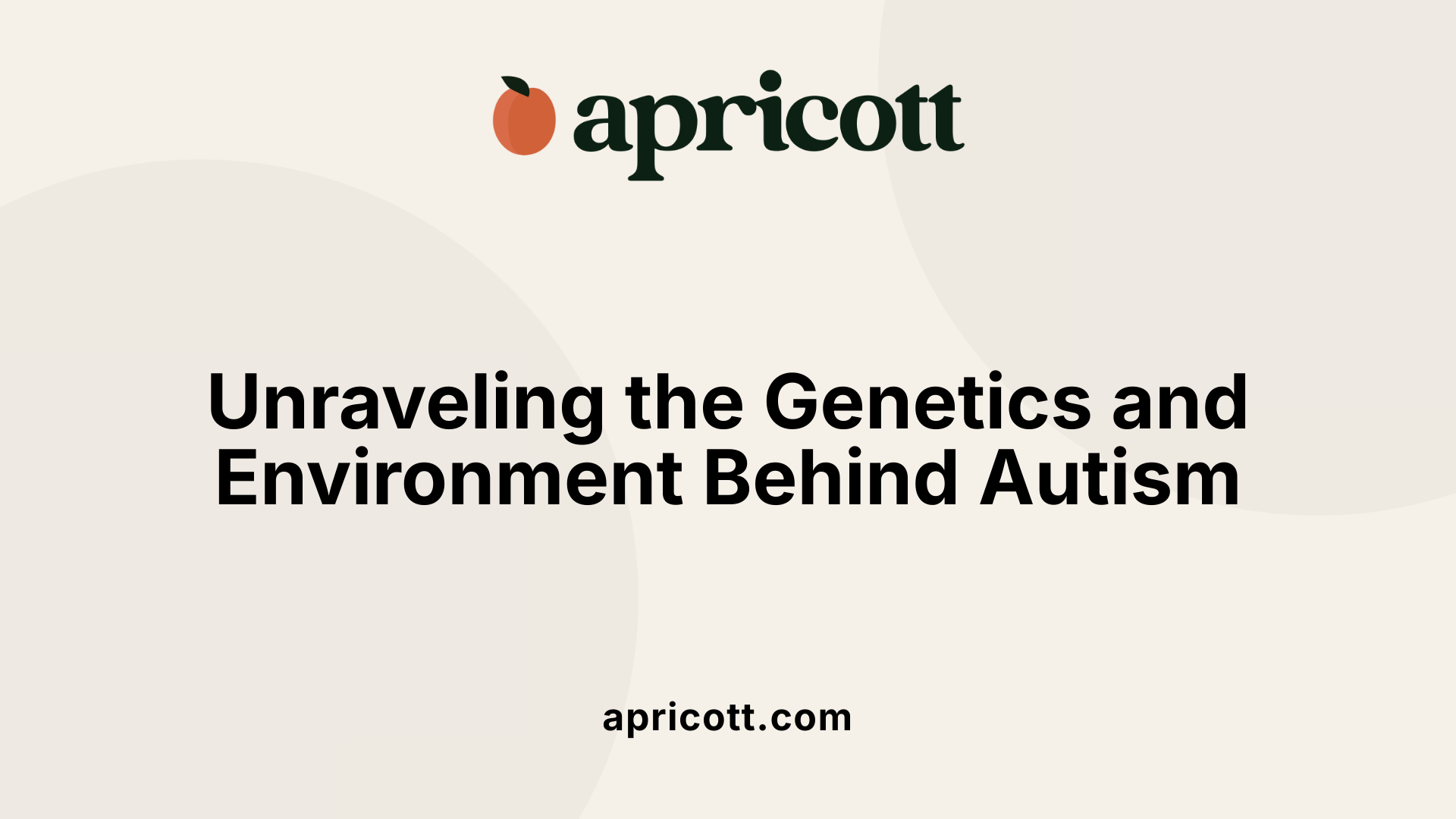
Both genetics and environmental factors play crucial roles in the development of autism spectrum disorder (ASD). Genetic influences are considered primary, with research estimating that up to 80-90% of ASD cases have a genetic basis. Twin studies reinforce this, showing high heritability, and numerous genes and spontaneous mutations (de novo mutations) have been linked to increased susceptibility.
Environmental factors also contribute to ASD risk, particularly exposures during critical periods of fetal development. These include prenatal exposures to toxins such as air pollution, pesticides, and certain medications like valproic acid, which can impact gene expression or induce genetic damage.
Regarding alcohol, it is known as a teratogen—a substance that can disrupt fetal development. Alcohol use during pregnancy can lead to Fetal Alcohol Syndrome (FAS), which involves neurological impairment, but current research indicates that alcohol consumption does not significantly increase the risk of autism on its own. Studies have shown no significant association between maternal alcohol intake during pregnancy and ASD diagnosis.
In summary, while genetics form the foundation of autism risk, environmental factors—including prenatal exposures—can influence its manifestation. Alcohol’s role is mainly associated with distinct conditions like FAS, rather than ASD specifically.
| Factor | Role in Autism Development | Additional Details |
|---|---|---|
| Genetic mutations and inheritance | Major contribution, including mutations and inherited variants | Up to 90% heritability in some studies |
| Twin studies | Demonstrate high genetic contribution | Monozygotic twins show higher concordance |
| Environmental toxins (air pollution, pesticides) | Influence gene expression or cause genetic damage | Critical during fetal development |
| Medications (valproic acid) | Known to increase risk, particularly when taken during pregnancy | Dose-dependent effects |
| Alcohol (maternal consumption) | Generally not linked to ASD but causes FASD, separate disorder | Not a major factor in ASD risk |
Search Query: Genetic and environmental factors in autism
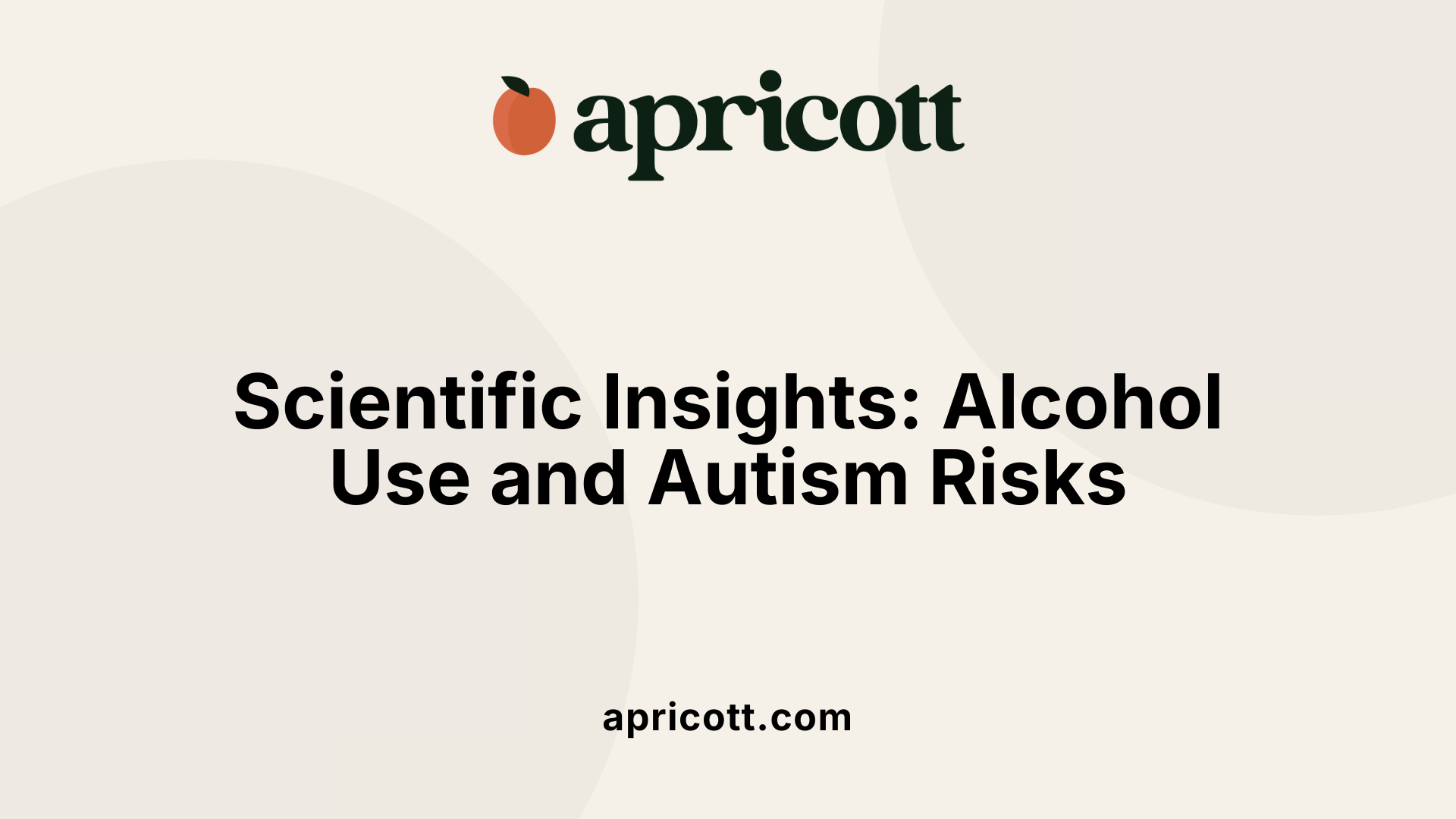
Research shows that alcohol use disorder (AUD) is relatively common among autistic adults, although the prevalence varies across different settings. In clinical samples, rates of AUD can reach up to approximately 16%, whereas population-based data often report lower rates. Autistic individuals may turn to alcohol to manage challenges like anxiety, sensory overload, and social difficulties, which are common traits associated with autism.
Many autistic individuals report using alcohol as a way to cope with anxiety and sensory sensitivities. Alcohol can sometimes temporarily ease feelings of social discomfort or sensory overload, leading some to develop patterns of hazardous drinking over time. While some studies suggest that autistic adults might have an increased risk for alcohol problems, others show mixed results, indicating that not all autistic people use or develop AUD.
Emerging research points towards shared neurological and genetic factors between ASD and substance use disorders. Certain brain pathways involved in reward processing, impulse control, and social behavior may be common to both conditions. These shared vulnerabilities can influence susceptibility to alcohol misuse, especially when combined with environmental and psychological factors.
| Aspect | Findings | Additional Details |
|---|---|---|
| AUD Prevalence | Up to 16% in clinical samples; lower in population data | Varies depending on the study setting |
| Use of Alcohol for Coping | Common among autistic adults for anxiety and sensory issues | May lead to long-term hazardous drinking cases |
| Biological Factors | Shared brain pathways and genetic vulnerabilities | Contributing to both ASD traits and substance use tendencies |
| Risk Factors | Co-occurring mental health issues, social environment, sensory processing patterns | Can increase likelihood of alcohol misuse |
Overall, the relationship between alcohol and autism involves a complex interplay of biological, psychological, and social influences. More tailored approaches are needed to support autistic individuals in managing these challenges and preventing harmful alcohol use.
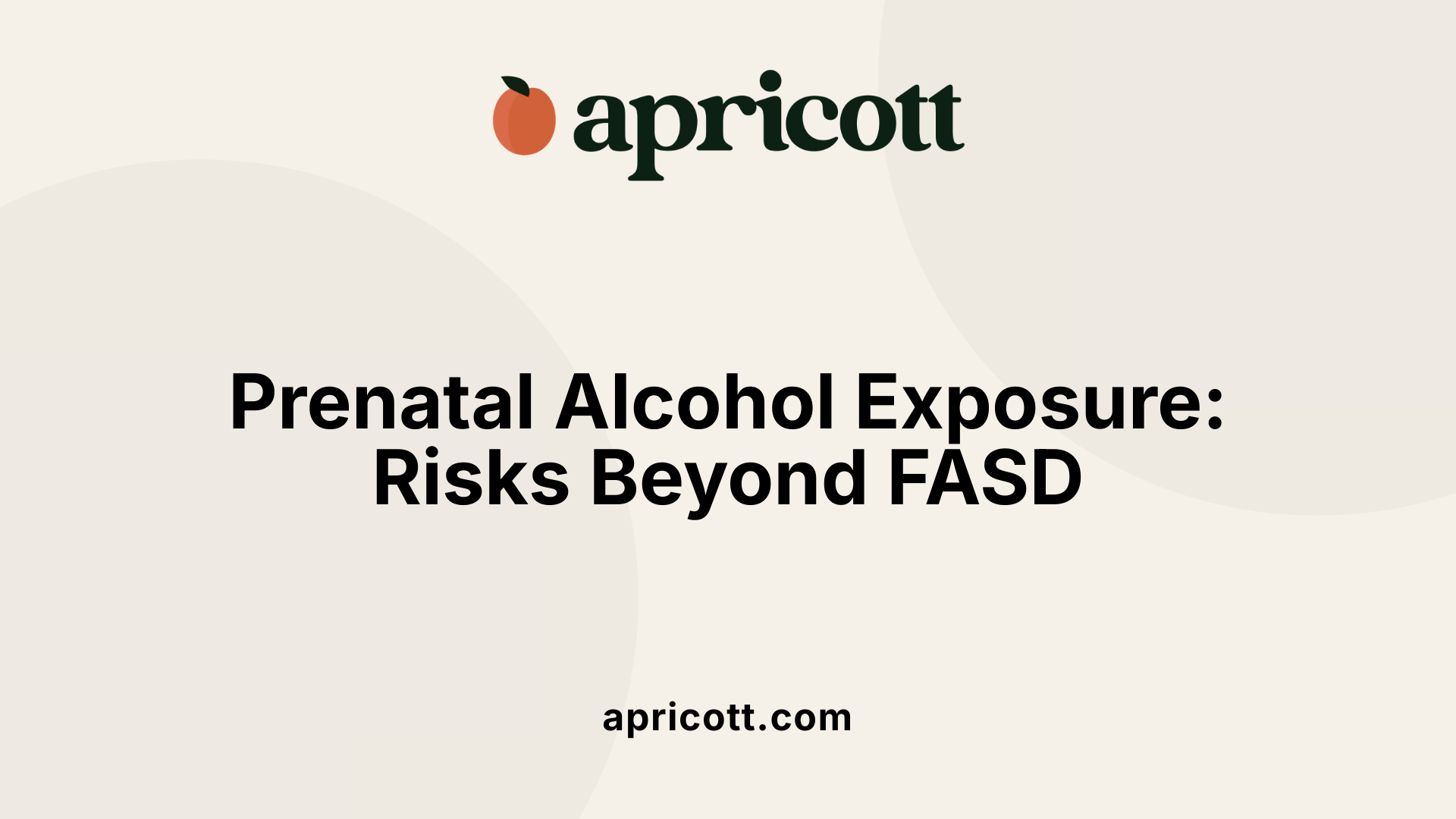
Current research suggests that drinking alcohol during pregnancy does not significantly raise the chances of a child developing autism spectrum disorder (ASD). Several large-scale cohort studies, including data from the UK’s Millennium Cohort Study and other national datasets, have examined maternal alcohol use and its effects on the child's development.
These studies analyzed thousands of mother–child pairs. For example, one study evaluated over 18,000 singleton pairs, finding no statistically significant difference in ASD risk among children of mothers who consumed low, moderate, or heavy amounts of alcohol during pregnancy. Odds ratios close to 1 indicate no increased risk; even heavy drinking, which was less common in these samples, did not show a clear link to autism.
However, it's important to note that alcohol intake—especially in large quantities—earlier in pregnancy can still be harmful. It has been linked to fetal alcohol spectrum disorders (FASD) and other neurodevelopmental issues. These conditions can include behavioral problems, learning disabilities, and neurological impairments.
While the evidence does not confirm an association between low to moderate alcohol use and ASD, alcohol exposure during pregnancy is still strongly discouraged. Its known risks include physical and cognitive impacts such as FASD, which are separate from autism but serious in their own right.
In summary, from the current data, light or moderate prenatal alcohol consumption does not appear to raise ASD risk. Nonetheless, it is safest for pregnant women to abstain from alcohol entirely to avoid other potential developmental problems.
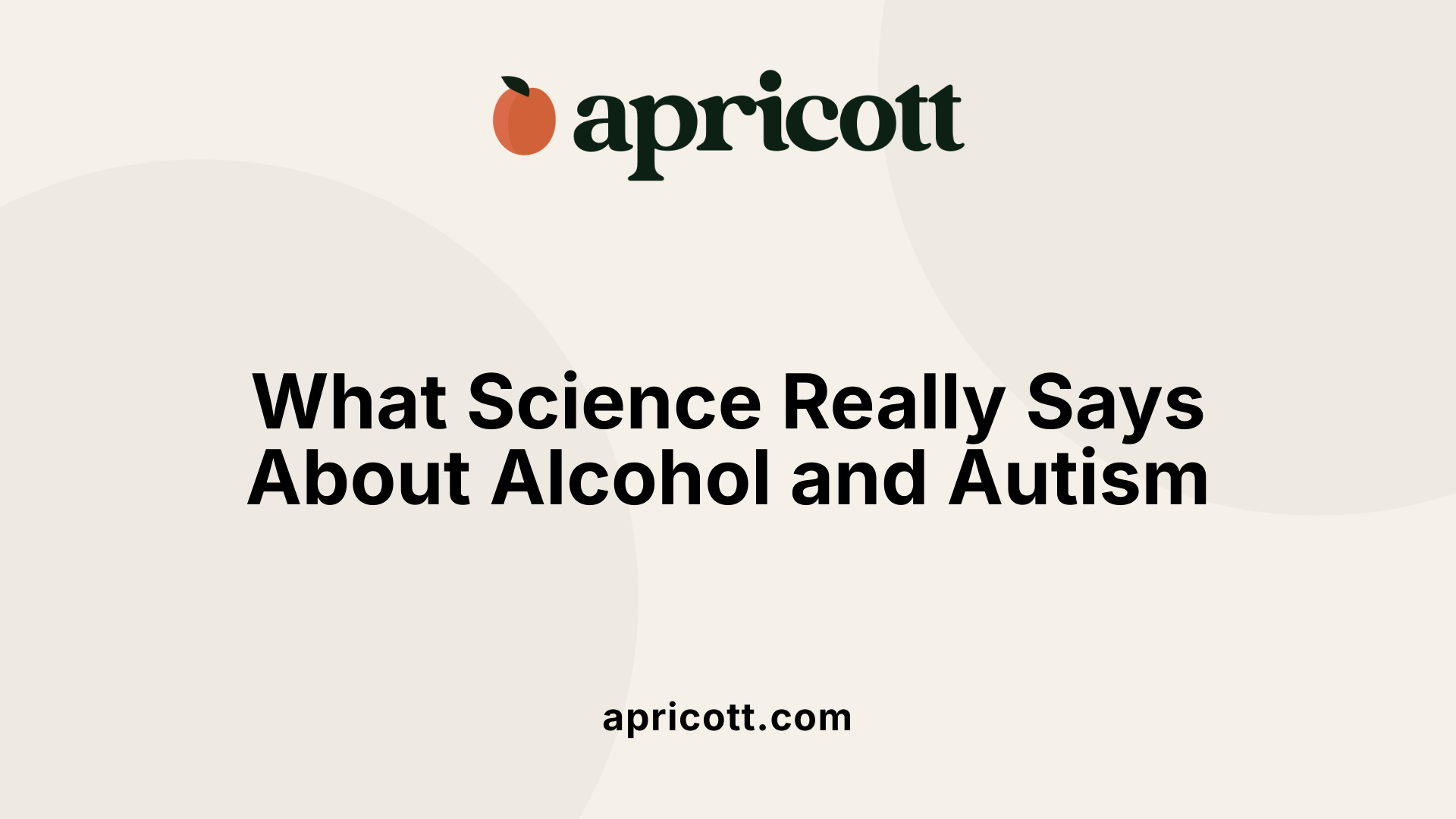
Research into the relationship between alcohol use and autism spectrum disorder (ASD) has provided some important insights. Studies show that even though prenatal alcohol exposure can cause fetal alcohol spectrum disorders (FASD)—a range of developmental issues—there is little evidence supporting a direct link between alcohol consumption during pregnancy and the development of ASD.
In fact, large-scale studies, such as the Millennium Cohort Study in the UK, have not found significant associations between maternal alcohol intake during pregnancy and ASD risk in children. These studies demonstrate that low to moderate alcohol consumption, including having 1–2 drinks per week, does not increase the chance of a child developing autism.
However, it is noteworthy that autistic individuals often have higher rates of alcohol use disorder (AUD). Some research estimates that up to 16.1% of autistic adults face challenges with problematic alcohol use. Many autistic people may use alcohol as a way to cope with social anxiety, sensory overload, or emotional distress.
Shared genetic and family factors might also influence this comorbidity. Importantly, AUD often develops later in life for autistic individuals, and protective factors—such as receiving an autism diagnosis and appropriate medication—can reduce the likelihood of problematic drinking.
Although there is no causal link between alcohol intake during pregnancy and autism, understanding the distinctions between FASD and ASD is vital. FASD results from high levels of alcohol exposure in the womb and leads to neurological and physical issues, whereas ASD is a neurodevelopmental condition with complex origins involving genetics.
Overall, scientific evidence underscores that drinking alcohol during pregnancy does not increase autism risk but can cause other serious issues, such as FASD. Meanwhile, addressing alcohol use among autistic adults requires tailored screening and support, considering the unique mental health and social challenges within this community.
| Aspect | Findings | Additional Details |
|---|---|---|
| Pregnancy alcohol use | No increased ASD risk | Large studies show no causal link for low- to moderate drinking |
| FASD | Caused by high alcohol intake | Different from ASD; includes physical and neurological impairments |
| Autism and AUD | Higher prevalence among autistic | Up to 16.1% affected, often due to self-medication |
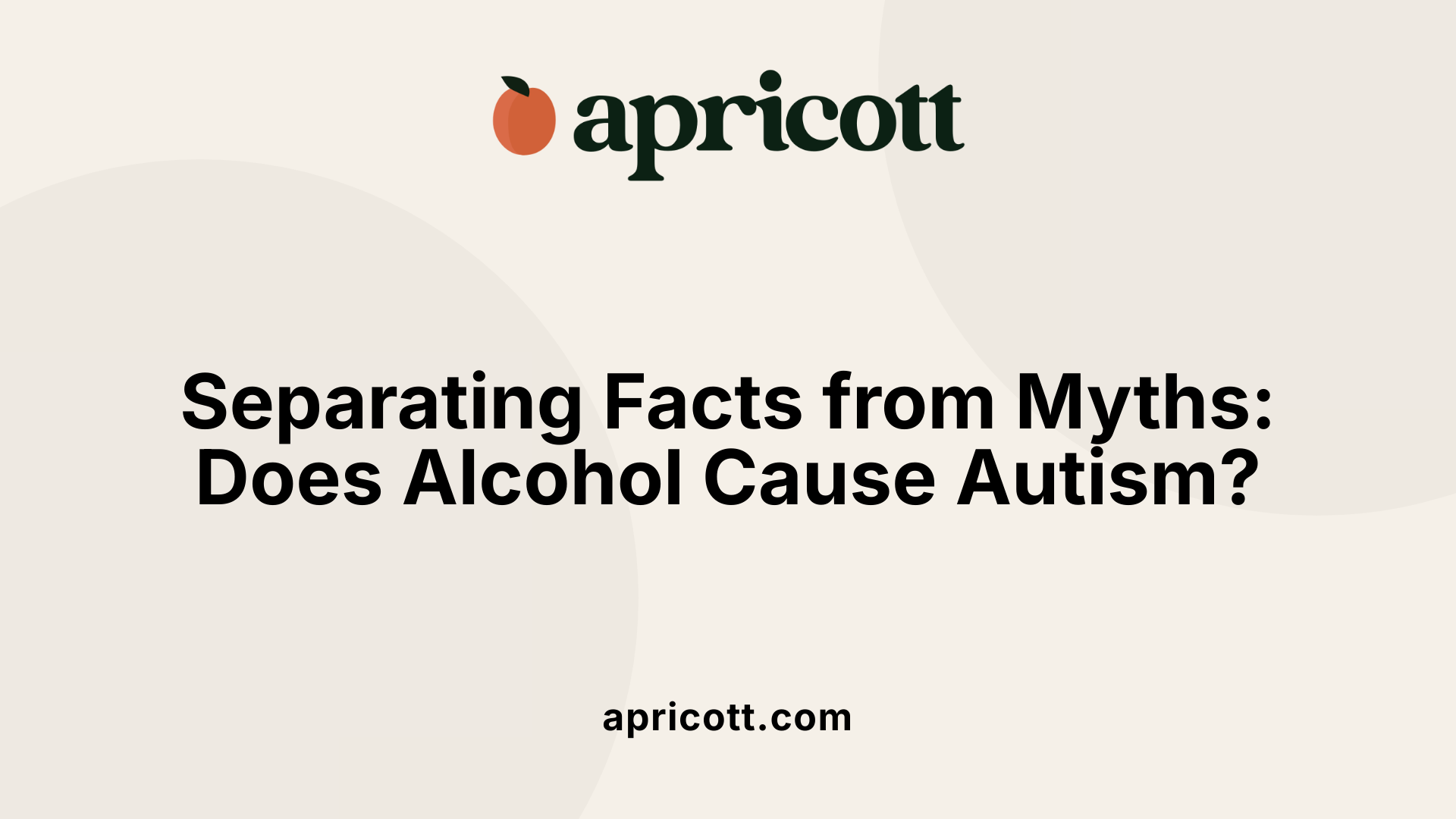
Current scientific evidence does not support a direct connection between maternal alcohol consumption during pregnancy and the risk of autism spectrum disorder (ASD). Numerous large-scale studies, including the recent Millennium Cohort Study from the UK, have examined maternal drinking patterns and their effects on child development. These studies consistently show no significant association between light, moderate, or even heavy alcohol use during pregnancy and ASD.
In these studies, the adjusted odds ratios for ASD in relation to alcohol consumption tend to hover around 1, indicating no increased risk. For example, even when heavy alcohol consumption was considered, the data did not reveal a statistically significant increase in ASD cases. This suggests that alcohol during pregnancy does not cause autism.
Although alcohol does not appear to be linked to autism, it is well-known to cause other serious developmental issues. The primary concern related to alcohol intake during pregnancy is Fetal Alcohol Spectrum Disorders (FASD), which include a range of physical, behavioral, and learning problems. FASD and ASD are separate conditions, with distinct features.
FASD can lead to lifelong disabilities such as growth deficiencies, characteristic facial features, and neurodevelopmental deficits. Despite these risks, no safe level of alcohol consumption during pregnancy has been established. Health authorities universally recommend abstaining from alcohol to prevent FASD and other neurological issues.
| Feature | Fetal Alcohol Spectrum Disorder (FASD) | Autism Spectrum Disorder (ASD) |
|---|---|---|
| Cause | Prenatal alcohol exposure | Genetic and neurodevelopmental factors |
| Symptoms | Physical abnormalities, cognitive deficits, hyperactivity | Social communication challenges, repetitive behaviors |
| Treatment | Supportive therapies, educational interventions | Behavioral therapies, speech therapy |
While FASD involves physical and cognitive impairments directly related to alcohol exposure, ASD involves distinct neurodevelopmental pathways. Importantly, FASD does not cause autism, although some overlapping symptoms may occur, which can complicate diagnosis.
It is noteworthy that some autistic individuals may use alcohol to cope with anxiety, sensory overload, or social difficulties. Studies suggest that autistic individuals are at a higher risk for developing alcohol use disorder (AUD), potentially due to self-medication. However, the reasons for alcohol use among autistic people are complex and varied.
Overall, despite some anecdotal reports, alcohol does not cause autism, and the primary health message remains clear: abstinence from alcohol during pregnancy is the safest choice for fetal health and development.

Fetal Alcohol Syndrome (FAS) is a serious condition caused by alcohol consumption during pregnancy. It leads to a range of developmental issues, including physical abnormalities, intellectual disabilities, and behavioral problems. Despite its severity, FAS is distinct from autism spectrum disorder (ASD) and is directly linked to prenatal alcohol exposure.
Even in the absence of FAS, alcohol exposure in the womb can affect a child's neurobehavioral development. Studies suggest that alcohol can impair motor skills, learning, and memory, especially if consumed in high amounts during pregnancy. These effects are separate from autism but can lead to other cognitive or behavioral challenges.
Alcohol consumed by mothers can pass into breast milk, impacting early motor development in infants. However, current research indicates that alcohol in breast milk does not cause ASD. Instead, it may temporarily influence motor skills and developmental milestones in breastfeeding infants.
| Impact Area | Effects | Additional Notes |
|---|---|---|
| Fetal Alcohol Syndrome (FAS) | Physical abnormalities, intellectual disabilities, behavioral issues | Severe, distinct disorder caused by prenatal alcohol exposure |
| General Neurobehavioral Effects | Motor skill impairment, learning difficulties, memory issues | Can occur even without FAS, depending on consumption levels |
| Alcohol in Breast Milk | Temporary effects on motor development, possible impact on early growth | Does not cause ASD but may influence early developmental milestones |
Understanding the broader implications of alcohol consumption during pregnancy and breastfeeding underscores the importance of abstaining from alcohol during these critical periods. The neurodevelopmental risks, ranging from FAS to subtler motor and cognitive effects, highlight why current medical advice strongly advocates for complete abstinence to promote optimal child development.

Autistic traits—such as unusual eye contact, intense interests, and unique language—can sometimes influence alcohol use patterns. Some autistic individuals may use alcohol as a way to manage social interactions, cope with sensory overload, or reduce anxiety.
Research indicates that autistic adults might be at increased risk for alcohol use disorder (AUD). Estimates vary widely, with some studies suggesting over twice the risk compared to non-autistic adults. Factors associated with higher risk include social anxiety, depression, and generalized anxiety, which can drive some to seek relief through alcohol.
While alcohol can provide temporary relief or social acceptance, it may also worsen mental health and physical well-being over time. Recognizing these traits and their interactions with alcohol use can help support tailored interventions and healthier coping strategies.
Many adults with autism report using alcohol to handle social anxiety, mask their difficulties, or manage sensory sensitivities. This self-medication can offer short-term benefits like increased confidence or relaxed social engagement.
However, reliance on alcohol is risky, as it can exacerbate underlying mental health issues or lead to dependency. Understanding the reasons behind alcohol use is crucial to addressing problematic behaviors and providing appropriate support.
Cognitive Behavioral Therapy (CBT) and other behavioral therapies show promise as effective treatments for autistic adults struggling with alcohol misuse.
CBT can be adapted specifically for autistic individuals, focusing on developing healthier coping mechanisms, managing anxiety, and addressing underlying issues that lead to alcohol use.
Currently, there is limited research on alcohol use disorder treatments specifically designed for autistic adults. Nevertheless, standard therapies are often modified to meet individual needs, helping improve outcomes.
Combining these therapies with ongoing support can aid autistic adults in managing their alcohol use and improving their overall well-being.
| Aspect | Details | Additional Insights |
|---|---|---|
| Alcohol use among autistic adults | Over twice the risk of AUD | Varied estimates, influenced by anxiety and social factors |
| Reasons for use | Social anxiety, masking, sensory overload | Short-term relief versus long-term risks |
| Treatment options | CBT, tailored behavioral therapies | Need for adaptations specific to autism |
| Effectiveness | Promising but limited research | Importance of personalized approaches |
Addressing alcohol use in the autistic adult population involves understanding the underlying reasons for use and implementing adapted treatments. Recognizing individual traits and challenges allows for better support and healthier coping strategies.
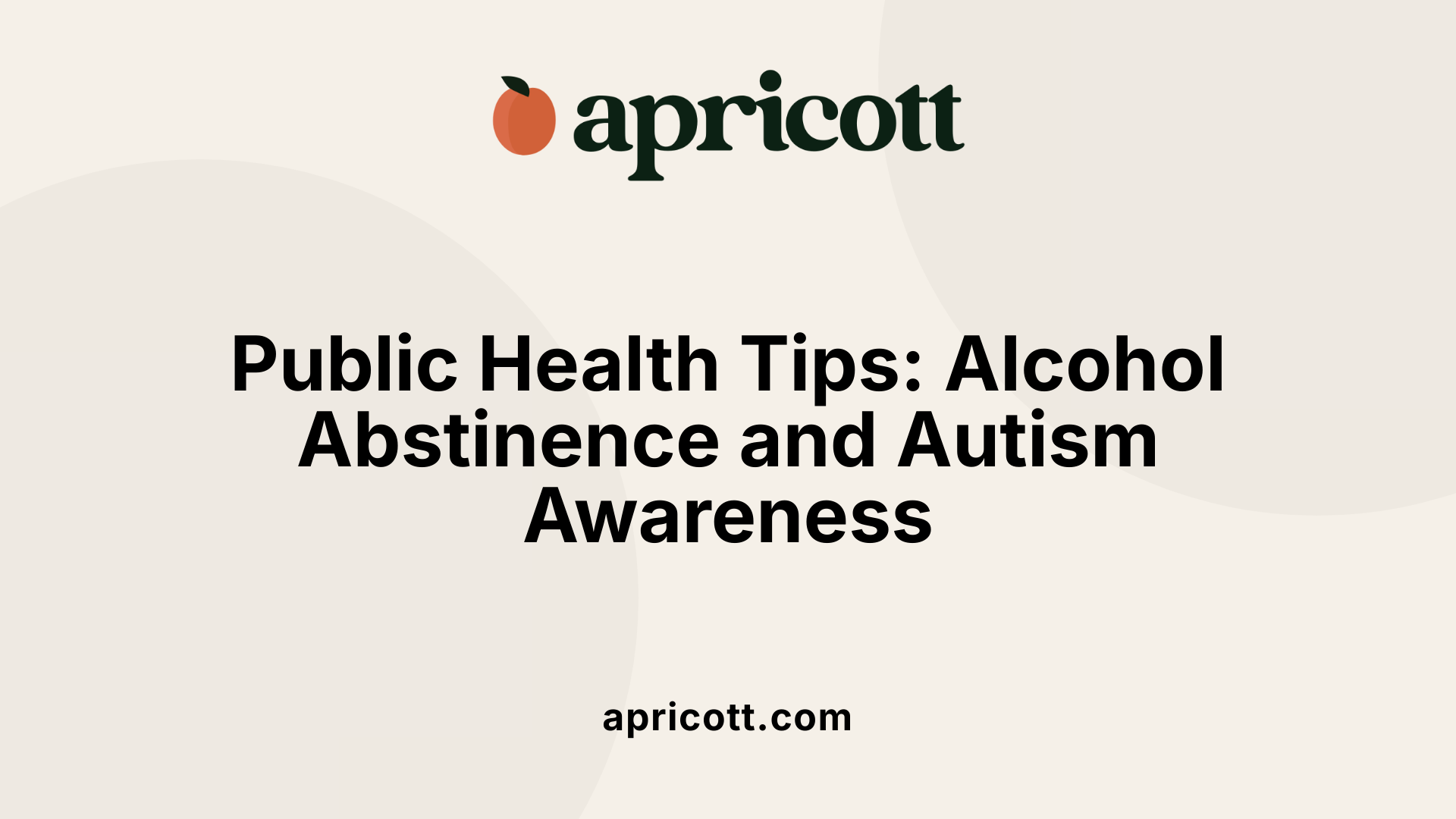
Medical authorities worldwide agree that there is no safe level of alcohol consumption during pregnancy. Despite some observational studies suggesting otherwise, current evidence strongly supports abstinence to prevent risks like Fetal Alcohol Syndrome and other neurological issues. Drinking alcohol during pregnancy is linked to developmental problems but does not appear to increase the risk of autism spectrum disorder (ASD), according to recent large studies.
Most cases of ASD are not caused by maternal alcohol intake, but understanding the dangers of alcohol during pregnancy remains crucial. Educating prospective mothers about the risks helps prevent other serious complications and promotes healthier fetal development. Additionally, recognizing that alcohol use does not cause ASD can reassure some, but the primary message still emphasizes abstinence to avoid preventable conditions.
Public health efforts should focus on promoting abstinence from alcohol during pregnancy and providing resources for those in need. For autistic individuals, particularly those who might use alcohol to cope with anxiety or sensory overload, tailored behavioral therapies like Cognitive Behavioral Therapy (CBT) can be effective. Supporting mental health, increasing awareness of autism traits, and offering appropriate interventions are essential steps to foster well-being.
Efforts to improve knowledge, reduce stigma, and encourage safe lifestyle choices are vital components of safeguarding both maternal and child health.
Although alcohol consumption during pregnancy is harmful and can lead to FASD and other developmental issues, current scientific evidence does not support a direct causal link between alcohol and autism spectrum disorder. The complex interplay of genetic and environmental factors plays a crucial role in autism's etiology. Autistic individuals may have higher incidences of alcohol use disorder, often linked to coping strategies for managing sensory, social, or anxiety-related challenges, underscoring the need for tailored support and intervention. It remains essential for pregnant women to abstain from alcohol to prevent known risks, but existing research makes clear that alcohol does not cause autism. Understanding these distinctions helps inform public health policies and supports a nuanced view of autism's complex origins.